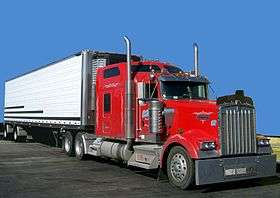Consolidated Freightways
 | |
| Public Company | |
| Fate | Bankruptcy |
| Successor | Con-Way |
Key people | Leland James (Founder) |
Consolidated Freightways (CF), was an American multinational LTL (Less Than Truckload) freight service and logistics company founded on April 1, 1929, in Portland, Oregon, and later relocated to Vancouver, Washington. Affectionately known as "CornFlakes", Consolidated Freightways was also the founder of the Freightliner line of heavy trucks, now owned by Daimler-Benz. At its height, the company possessed over 350 terminals, employing more than 15,000 truck drivers, dock workers, dispatchers and management. Consolidated Freightways was once the nation's number one long-haul trucking company and the 3rd largest-ever U.S. bankruptcy filing.
History
On April 1, 1929 Consolidated Freightways was founded by Leland James as a single truck LTL operation in Portland, Oregon. The company realized expanded growth rather quickly. James was an innovator, and purchased his custom power units from Freightways Manufacturing Company. Always striving to haul more product on a truck/trailer combination, James helped design the first C.O.E. (Cab Over Engine) cab-over power units the United States had ever seen. The power units were lightweight and short, allowing for an additional freight box mounted on the frame of the truck behind the cab (single trailer units). With the short cab-overs, short trailers (hitched as doubles) could be lengthened, allowing for more freight as well. Length laws were stringent in the 1930s, so if a company were to survive they had to be innovative. In Nov. 1951, Consolidated Freightways went public, opening on the New York Stock Exchange at $1.80. The stock was valued at $38.00/share in 1981. In 1981, CF won a case before the U.S. Supreme Court, Kassel v. Consolidated Freightways Corp.. The court found that Iowa's length restriction on tractor-trailers violated the Dormant Commerce Clause.
In 1983, CF Inc. ventured into regional trucking with its spin off Con-Way carriers.[1] Consolidated Freightways' drivers and dockworkers were unionized, and the new Con-Way (Con-way Central Express (CCX), Con-way Western Express (CWX), Con-way Eastern Express (CEX), etc.)[2] were nonunion, creating tense relations with CF's Teamsters.
On April 3, 1989, CF Inc. purchased Emery Air Freight Corp. merging it with their own CF AirFreight operation and renamed it Emery Worldwide. This, along with Menlo Forwarding, was later sold to UPS.[3]
In 1996, Consolidated Freightways, Inc. spun off its unionized long-haul trucking company, CF MotorFreight, creating two separate publicly traded companies. Parent company, Consolidated Freightways, Inc. was renamed CNF Transportation Inc., reflecting the familiar stock ticker symbol of the company (CNF). CNF retained the Con-Way regional trucking companies, Emery Worldwide and a growing logistical systems department.[4]
Consolidated Freightways Corporation filed for Chapter 11 bankruptcy on September 3, 2002, and ceased operations.[5][6][7]
April 18, 2006, CNF Transportation re-branded itself under its Con-Way image and continues in business today.[8]
On October 30, 2015, Con-way Trucking was acquired by Greenwich, CT-based XPO Logistics, Inc.

Freightliner
In 1939, CF Inc. bought Freightways Manufacturing, re-branding it as Freightliner Manufacturing. White Motor Company marketed and sold the excess trucks that Consolidated didn't need, as it expanded, creating the White/Freightliner name. Consolidated also built their own trailers, eliminating the middleman and allowing for costs to stay low. By purchasing custom trucks from a company they owned and building their own trailers, CF was able to hold a strategic advantage over its competition. Because of a deregulation bill passed by Congress in 1980, on July 31, 1981, CF Parent company Consolidated Freightways, Inc. sold its truck manufacturing business and the Freightliner brand to Daimler AG.[9]
See also
References
- ↑ Kenneth D. Durr, Philip L. Cantelon (1999). Never Stand Still - a History of CNF Transportation Inc. Rockville, Maryland: Montrose Press. p. 562. LOC 99-74784.
- ↑ "Con-Way History". Con-way.com. Retrieved 27 June 2014.
- ↑ Kenneth D. Durr, Philip L. Cantelon (1999). Never Stand Still - a History of CNF Transportation Inc. Rockville, Maryland: Montrose Press. p. 562. LOC 99-74784.
- ↑ Kenneth D. Durr, Philip L. Cantelon (1999). Never Stand Still - a History of CNF Transportation Inc. Rockville, Maryland: Montrose Press. p. 562. LOC 99-74784.
- ↑ "CFC Trust". Archived from the original on 2010-11-20. Retrieved 5 December 2012.
- ↑ New York Times (3 September 2002). "Consolidated Freightways Nears Collapse". The New York Times. Retrieved 11 November 2012.
- ↑ "Consolidated Freightways Chapter 11 Petition" (PDF). PacerMonitor. PacerMonitor. Retrieved 9 June 2016.
- ↑ Con-Way. "History". Retrieved 11 November 2012.
- ↑ Kenneth D. Durr, Philip L. Cantelon (1999). Never Stand Still - a History of CNF Transportation Inc. Rockville, Maryland: Montrose Press. p. 562. LOC 99-74784.
